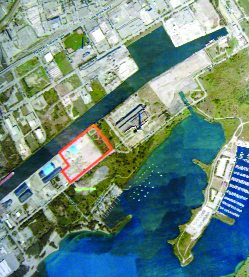By Kimberly Spice —

Community members view display panels like the one above, showing the potential location of the soil management stockpile.
Contaminated soil in the Port Lands will have to be treated or removed before development of the area can begin, said a senior environmental geoscientist during an open house to discuss the project.
“It’s a manageable issue when we stockpile it,” Steve Desrocher, the senior environmental geoscientist and project manager from Environ told The Bulletin. “It’s a byproduct of a long history of industrialization.”
“Based on our current science we believe that some of it can’t remain in place for the intended land uses without treatment because the contaminant levels are too high.”
More than 20 curious neighbours of the Port Lands development attended the open house on Oct. 6 at the Waterfront Toronto offices on Bay to view posters and talk to officials about the process and possible hazards of excavating soil.
Samples will be taken and sent to laboratories and depending on the level of contaminants will either remain in the area to be stockpiled and treated or, if labeled hazardous, will be permanently shipped out to facilities able to handle this type of material.
 A number of technologies will be used to clean the soil including washing the it with recycled water until contaminant levels are low enough for reuse.
A number of technologies will be used to clean the soil including washing the it with recycled water until contaminant levels are low enough for reuse.
Recycled water will help protect the environment and additional environmental measuring equipment will monitor air quality.
“These read in real time,” explained Desrocher about the measuring equipment. “If there is a dust condition an alarm gets triggered so that we can mitigate either by adding more soil binding agents for stabilization or what ever we need to do to control that dust.”
Air and weather conditions outside of the development area will also trigger changes in the stockpile and treatment process.
“On bad air quality days we can scale our operation so that we are not contributing,” said Kevin Bechard, Director Environmental Assessments, Waterfront Toronto.
Another public meeting is pending while Councillor Paula Fletcher has requested an information session be arranged for the people in her riding for some time in November.
Information will be posted on www.waterfrontoronto.ca.
 TheBulletin.ca Journal of Downtown Toronto
TheBulletin.ca Journal of Downtown Toronto

